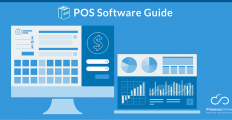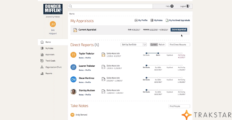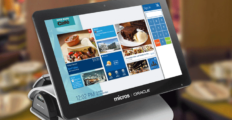The global economy relies on the transportation industry, acting as its essential vascular system. Whether it’s the products we order online or the goods on supermarket shelves, everything travels through a complex network of supply chains and logistics before reaching its destination.
Managing a large-scale transportation operation is like solving a complex puzzle, where many small pieces need to fit together smoothly. This is where a Transportation Management System (TMS) becomes crucial.

What is a Transportation Management System (TMS)?
It’s a comprehensive logistics platform. Its purpose is to assist logistics providers in planning, executing, and optimizing the movement of goods while staying compliant with regulations.
A TMS stands out as one of the most vital solutions in a modern transportation company. It plays a central role in every aspect of the supply chain – from planning and procurement to lifecycle and logistics management. This is likely why there’s a growing trend in adopting such tools. Projections indicate that the global Transportation Management System market is set to increase from 13.5 billion USD in 2023 to over 33 billion by 2028, showcasing a remarkable Compound Annual Growth Rate (CAGR) of 19.7%.
Such software is often modular, meaning that you can get different functions separately depending on your needs. It offers features such as:
Shipment planning
- Manage shipments electronically, specifying details like weight, dimensions, send time, and recipient.
- Real-time tracking and notifications during transit.
Load planning
- Effectively distribute carrier loads, choosing transportation modes (e.g., car or plane) and optimizing parcel distribution.
Price comparison
- Quickly compare shipping providers’ rates to choose the best cost-effective option.
Real-time tracking
- Customized GPS tracking with simultaneous tracking of multiple shipments on one map.
- Alerts at waypoints and easy access to transportation reports.
Carrier performance monitoring
- Analyze carriers based on metrics like on-time delivery, transit times, and overall reliability.
- Informed decisions on carrier partnerships for different routes.
Shipment documentation
- Store all shipment-related documents (e.g., bill of lading, commercial invoice) in one place.
- Handy features for document editing.
Analytics and reporting
- Monitor transportation process effectiveness with customizable indicators and reporting options.
- Fill out mandatory industry reports seamlessly.
TMS has two main user groups:
- Shippers, manufacturers, and distributors.
- Third-party logistics providers (3PLs).
Choosing a transportation management system for your company is a huge decision because there are a variety of providers and features. A TMS helps companies move freight efficiently, reliably, and at lower rates. Implementing a TMS allows you to monitor and evaluate process analytics and optimization. It can route drivers, schedule deliveries, and report business KPIs.
At present, only 35% of shippers are using transportation management systems. Choosing the right one positions you to be a market leader and gain a competitive advantage.
Custom vs. off-the-shelf TMS
At the heart of efficient logistics management lies the choice between adopting a custom transportation management system tailored to specific needs or opting for the convenience of an off-the-shelf solution. Each option has its pros and cons and below we’ll discuss both in more detail.
Functionality
Custom TMS is crafted to meet specific business requirements, aligning transportation processes seamlessly with overall operational strategies. Contrary to the common belief that it’s always built from scratch, it may involve modifying an existing application.
On the other hand, off-the-shelf TMS offers standard convenience for businesses seeking a swift solution. Pre-built software solutions come with predefined features, requiring minimal configuration before implementation.
Customization
As business processes evolve and industry landscapes change, a custom solution can be adapted and modified to suit the specific challenges and demands of the company. This adaptability ensures that the TMS remains a valuable asset over the long term.
While off-the-shelf solutions provide convenience, they do come with a trade-off in terms of customization. Businesses may find themselves limited in their ability to tailor the TMS to unique processes or industry-specific demands. This limitation can be a drawback for companies with highly specialized logistics needs.
Scalability
When you order a custom-built TMS, you can have it changed and adapted to your preferences. Since it was initially designed with your requirements in mind, you’ll be able to scale or change it as needed. Custom TMS can seamlessly scale as the business grows, accommodating increased shipment volumes, additional users, and changing logistics processes.
Off-the-shelf TMS solutions come with predefined features suitable for a broad range of users. While they may offer scalability, it is often within the limitations of the standardized features as they are not specifically designed to cater to the unique or constantly changing requirements of a particular business.
Integrations
Integrating third-party systems into a custom TMS is generally easier due to its flexibility and tailor-made nature. Off-the-shelf TMS solutions offer predefined integrations that can be easier to set up initially, but they may lack the adaptability needed for unique or evolving business requirements.
Maintenance
Off-the-shelf products usually have reliable long-term support, especially if they’re from a well-known company. You can expect help when you need it, but updates happen on the developer’s schedule. Custom solutions offer support as long as you use them, and you have more control over when updates occur.
Time
In the speedy world of logistics, time is crucial. Choosing an off-the-shelf product is always quicker than waiting for a custom order. Certain software partners expedite delivery by optimizing processes and using Agile methodologies. However, custom development will inevitably take a minimum of a few weeks or months.
Price
When evaluating software expenses, it’s vital to look beyond the upfront purchase cost. Total operating costs include maintenance, scalability, and future adjustments.
Creating a custom TMS tailored to your needs requires a higher initial investment compared to off-the-shelf options. On the flip side, off-the-shelf software is generally more budget-friendly initially, often charging per user or with a monthly/annual license fee. However, long-term costs can escalate, particularly if you need to add users or customize the application.
When custom TMS is the right choice for you
When considering a custom TMS:
- You want more control.
- Your team juggles multiple tools for various processes.
- Integration with existing systems is crucial.
- Important data is scattered across different locations.
- Compliance regulations and security are top concerns.
- Future scaling or significant changes are on the horizon.
- End customers face issues with cluttered and scattered systems.
- A comprehensive solution that meets all your needs is hard to find.
When off-the-shelf TMS is the right choice for you
Buying an off-the-shelf TMS is most suitable in two main scenarios:
- Existing solution alignment: If there is an application with the exact features you need, especially if others in your industry use it successfully, it’s likely a good fit.
- Limited growth or changes: Off-the-shelf solutions may lack scalability and flexibility. If you don’t plan to add users, change processes, or significantly grow your business, a standard application can be suitable.
Wrap up
Ultimately, the choice between a custom and off-the-shelf TMS depends on various factors, including the complexity of business processes, budget considerations, and the need for unique features.
The main advantage of custom software is that it’s completely tailor-made. As such, you can request anything you want or need. If you can’t find the perfect combination of features you need, a custom software provider will create it for you.
Some companies may find that a hybrid approach, incorporating elements of both customization and pre-built solutions, offers the ideal balance.























Leave a comment!